Writing Angsty Scenes Without Making Them Cringe
Writing Angsty Scenes Without Making Them Cringe
Alright, so we all love a good angsty moment, right? That scene where everything feels like it's falling apart, emotions are running high, and your character's world is just burning around them. But… writing those scenes without slipping into "oh no, not this again" territory? Yeah, it can be tricky.
Angst is powerful, no doubt, but it can get cringey fast if you’re not careful. So, how do you make your readers feel the hurt without rolling their eyes at the drama? Here are some thoughts (because we’ve all been there)
1. Keep It Real No one—and I mean no one—has perfectly poetic, life-altering thoughts while they’re in the middle of an emotional meltdown. If your character’s going through it, make sure their reactions feel raw, maybe even messy. Show us their confusion, anger, and fear in a way that makes sense for them. Don’t just throw in a monologue about the meaning of life or have them collapse in a rainstorm. (Unless it’s really necessary. Then, okay, fine, but be careful!)
2. The Little Details Hit Harder Sometimes, it’s the small, unexpected details that pack the biggest punch. Instead of a dramatic sobbing fit, maybe your character’s hands shake as they try to make a cup of tea or they notice a tiny crack in the wall that they never noticed before because they’re spiraling. It’s those little, relatable moments that make the angst feel real, not overdone.
3. Embrace the Quiet Moments It doesn’t always have to be yelling or crying to show that your character is struggling. Silence can be loud. Sometimes it’s the things unsaid that carry the most weight. Maybe your character withdraws, or they’re stuck staring at the ceiling for hours. A pause in the conversation, a long sigh, or a blank stare can be just as gut-wrenching as full-on breakdowns.
4. Avoid the Obvious Clichés (If You Can) Okay, this one’s a bit tricky. It’s not that you can’t ever have rain scenes or broken mirrors (I see you, “symbolism”), but if you’re gonna go there, give it a twist. Maybe instead of staring out a window during a storm, they’re in a brightly lit, overly cheerful room that just doesn’t match how they’re feeling. Play with contrasts. Make the environment work against their mood rather than mirroring it perfectly.
5. Let the Angst Breathe Don’t feel like you need to dump all the angst in one scene. Let it stretch out a bit. Give your characters space to process (or fail to process) over time. A lot of times, readers will feel more for a character who’s quietly unraveling over several chapters than one who explodes all at once. It makes the eventual breakdown hit harder when it does happen.
6. People Are Weird When They’re Hurting They joke at the wrong times. They say things they don’t mean. They shut people out, or they get way too clingy. Don’t be afraid to make your characters react in unexpected or contradictory ways—people do that when they’re feeling too much. Let your characters be complicated, because real people are.
7. Subtle Can Be Stronger Not every angsty scene needs a screaming match or someone running away dramatically. Sometimes, a single line of dialogue or a character’s slight change in expression can hit like a freight train. Try letting things simmer. Hold back when it feels like you should go big, and you might surprise yourself (and your readers) with how much more intense it feels.
More Posts from Allegedlyiwrite and Others
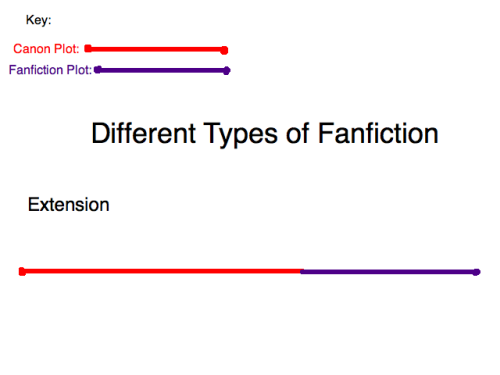
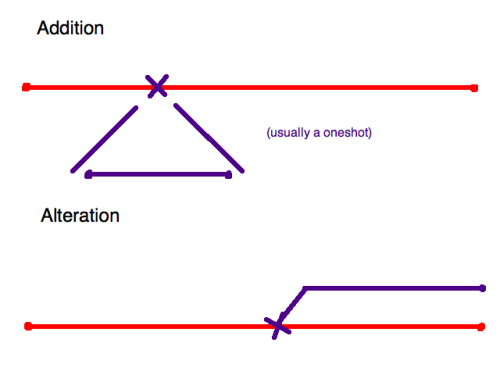
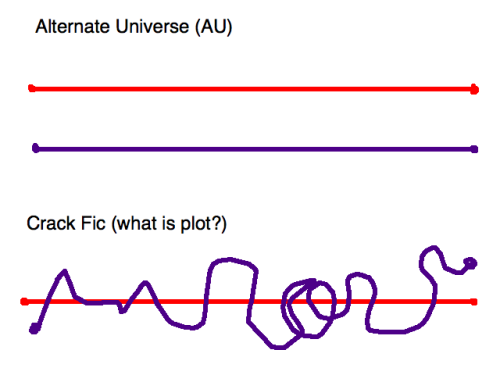
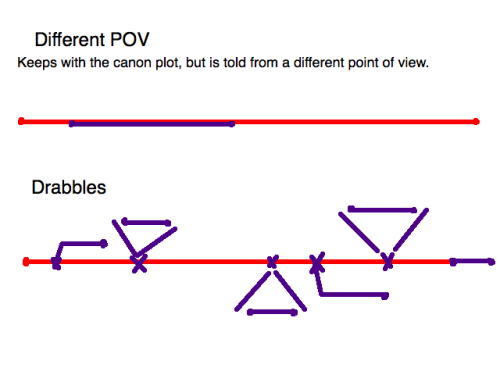
I don’t know if anyone has ever done this before but, here ya go… The Different Types of Fanfiction!
I probably left a few out, but these are the most common, compared to their base fiction’s canon plot. Enjoy! XD
being disabled will really have you thinking/saying things like “yeah i’m not really THAT disabled. as long as i take my meds twice a day (and as needed), eat and drink exactly the right things, keep the perfect balance of being active and resting, the weather is stable, and nothing unexpected happens AT ALL… i’m totally FINE! i probably should not even call myself disabled at this point because i’m doing so well!”
if you don’t want to call yourself disabled, that’s fine and it is your choice! but if you’re only “fine” or “doing really well” when a bunch of different variables are all lined up perfectly, then maybe you are not fine actually. just a thought!
Have I written in the past couple days? No. Are my daydreams going stupid? Hell yeah. When I have time to actually write it down will I still remember any of this lore? TBD
Have I written every day since I made my schedule?
Yes.
Did on work on any of my wips?
No.
Did I start a new story and get way too invested?
Hell yeah!
I just made an actual schedule for what writing projects I should focus on each day for the next week. So that way I can hopefully make progress on my fic and on revising poems for my slam team at the same time. We’ll see if the adhd cooperates.

Notes from a 5-day creative writing course:
Motivation
Make it a habit. That way, each time that familiar voice of self-doubt makes its appearance, it’ll be easier to ignore it, because writing will become something that you do-your thing-and you’ll gain confidence in it.
Visit your novel every single day. It doesn’t necessarily mean that you have to write something every day. You could outline the plot, or write character portraits, or draw a special part of your world. Your subconscious will work on your story even when you don’t. So, each time you visit the story consciously, you’ll find that things have developed in the story.
Manage the time of writing in a way that it is manageable for you. (It can be that one hour between classes or your lunch break or the morning before you go to work or at night before you sleep - Schedule it in a way that suits you and then, be serious about it.
Set a goal. For example, 100 or 500 words a day.
Keep reading
plotting out my characters’ emotional growth while simultaneously avoiding my own: a memoir.
I think that “there are some fanfiction that are on par with or better than some professionally published books” and “you shouldn’t hold fanfiction to the standards you hold professionally published books as they are often only written by one not professional writer with no editor” are two statements that can and should coexist
my 10 holy grail pieces of writing advice for beginners
from an indie author who's published 4 books and written 20+, as well as 400k in fanfiction (who is also a professional beta reader who encounters the same issues in my clients' books over and over)
show don't tell is every bit as important as they say it is, no matter how sick you are of hearing about it. "the floor shifted beneath her feet" hits harder than "she felt sick with shock."
no head hopping. if you want to change pov mid scene, put a scene break. you can change it multiple times in the same scene! just put a break so your readers know you've changed pov.
if you have to infodump, do it through dialogue instead of exposition. your reader will feel like they're learning alongside the character, and it will flow naturally into your story.
never open your book with an exposition dump. instead, your opening scene should drop into the heart of the action with little to no context. raise questions to the reader and sprinkle in the answers bit by bit. let your reader discover the context slowly instead of holding their hand from the start. trust your reader; donn't overexplain the details. this is how you create a perfect hook.
every chapter should end on a cliffhanger. doesn't have to be major, can be as simple as ending a chapter mid conversation and picking it up immediately on the next one. tease your reader and make them need to turn the page.
every scene should subvert the character's expectations, as big as a plot twist or as small as a conversation having a surprising outcome. scenes that meet the character's expectations, such as a boring supply run, should be summarized.
arrive late and leave early to every scene. if you're character's at a party, open with them mid conversation instead of describing how they got dressed, left their house, arrived at the party, (because those things don't subvert their expectations). and when you're done with the reason for the scene is there, i.e. an important conversation, end it. once you've shown what you needed to show, get out, instead of describing your character commuting home (because it doesn't subvert expectations!)
epithets are the devil. "the blond man smiled--" you've lost me. use their name. use it often. don't be afraid of it. the reader won't get tired of it. it will serve you far better than epithets, especially if you have two people of the same pronouns interacting.
your character should always be working towards a goal, internal or external (i.e learning to love themself/killing the villain.) try to establish that goal as soon as possible in the reader's mind. the goal can change, the goal can evolve. as long as the reader knows the character isn't floating aimlessly through the world around them with no agency and no desire. that gets boring fast.
plan scenes that you know you'll have fun writing, instead of scenes that might seem cool in your head but you know you'll loathe every second of. besides the fact that your top priority in writing should be writing for only yourself and having fun, if you're just dragging through a scene you really hate, the scene will suffer for it, and readers can tell. the scenes i get the most praise on are always the scenes i had the most fun writing. an ideal outline shouldn't have parts that make you groan to look at. you'll thank yourself later.
happy writing :)
I just found the funniest font ever
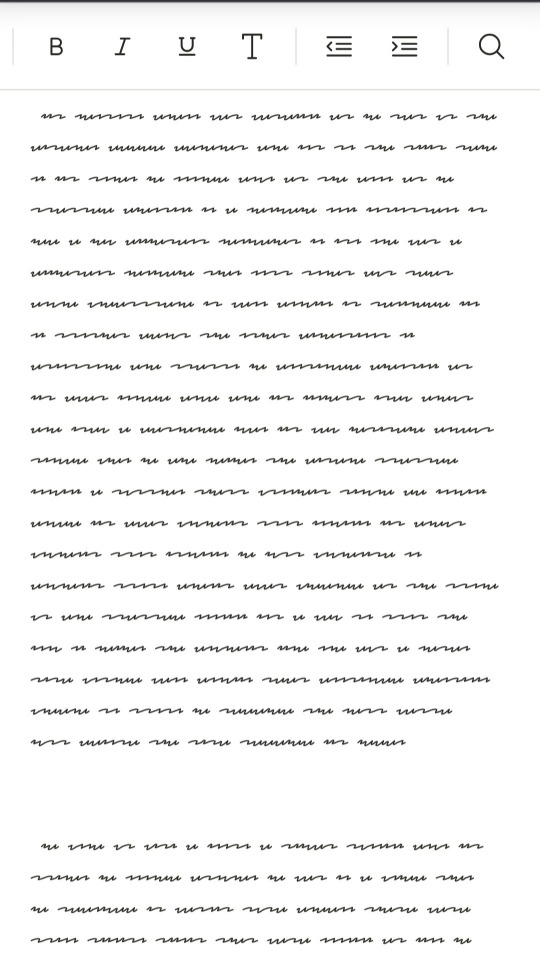
Like. What is this. Why is this. Who is the target audience of this?
You will not use AI to get ideas for your story. You will lie on the floor and have wretched visions like god intended
-
 iamtechnos-world liked this · 1 week ago
iamtechnos-world liked this · 1 week ago -
 james-silenthill liked this · 1 week ago
james-silenthill liked this · 1 week ago -
 seeking-vision liked this · 1 week ago
seeking-vision liked this · 1 week ago -
 flwhorencepew liked this · 2 weeks ago
flwhorencepew liked this · 2 weeks ago -
 trulygothgirl liked this · 2 weeks ago
trulygothgirl liked this · 2 weeks ago -
 heckcareoxytwit liked this · 3 weeks ago
heckcareoxytwit liked this · 3 weeks ago -
 ethernet-serenity reblogged this · 1 month ago
ethernet-serenity reblogged this · 1 month ago -
 lazyarly liked this · 1 month ago
lazyarly liked this · 1 month ago -
 serenity090890 liked this · 1 month ago
serenity090890 liked this · 1 month ago -
 coyotepoet liked this · 2 months ago
coyotepoet liked this · 2 months ago -
 horrorived liked this · 3 months ago
horrorived liked this · 3 months ago -
 madelie33333 liked this · 4 months ago
madelie33333 liked this · 4 months ago -
 casualphantompanda liked this · 4 months ago
casualphantompanda liked this · 4 months ago -
 saminorbit reblogged this · 5 months ago
saminorbit reblogged this · 5 months ago -
 yourstruly9489 liked this · 5 months ago
yourstruly9489 liked this · 5 months ago -
 jajaaouu liked this · 5 months ago
jajaaouu liked this · 5 months ago -
 scentedinfluencerwasteland liked this · 6 months ago
scentedinfluencerwasteland liked this · 6 months ago -
 elliedlightz liked this · 6 months ago
elliedlightz liked this · 6 months ago -
 serenade-of-midnight liked this · 6 months ago
serenade-of-midnight liked this · 6 months ago -
 swimdog98 liked this · 6 months ago
swimdog98 liked this · 6 months ago -
 jinxdrawsstuff liked this · 6 months ago
jinxdrawsstuff liked this · 6 months ago -
 cli0-0 liked this · 6 months ago
cli0-0 liked this · 6 months ago -
 allegedlyiwrite reblogged this · 6 months ago
allegedlyiwrite reblogged this · 6 months ago -
 allegedlyiwrite liked this · 6 months ago
allegedlyiwrite liked this · 6 months ago -
 cyb3r-st4t liked this · 6 months ago
cyb3r-st4t liked this · 6 months ago -
 in-asterism liked this · 6 months ago
in-asterism liked this · 6 months ago -
 weirdestwebizen liked this · 6 months ago
weirdestwebizen liked this · 6 months ago -
 mariiiibug liked this · 6 months ago
mariiiibug liked this · 6 months ago -
 heoflittlesleep liked this · 6 months ago
heoflittlesleep liked this · 6 months ago -
 snow-blower liked this · 6 months ago
snow-blower liked this · 6 months ago -
 cherrybean-boy liked this · 6 months ago
cherrybean-boy liked this · 6 months ago -
 19-magic-dogs liked this · 6 months ago
19-magic-dogs liked this · 6 months ago -
 whokerst liked this · 6 months ago
whokerst liked this · 6 months ago -
 howlsinthemoss liked this · 6 months ago
howlsinthemoss liked this · 6 months ago -
 sinandsadism liked this · 6 months ago
sinandsadism liked this · 6 months ago -
 sassyclassykenway liked this · 6 months ago
sassyclassykenway liked this · 6 months ago -
 aaurion liked this · 6 months ago
aaurion liked this · 6 months ago -
 rukia-kuchiki-divided liked this · 6 months ago
rukia-kuchiki-divided liked this · 6 months ago -
 severewritingofpoetry liked this · 6 months ago
severewritingofpoetry liked this · 6 months ago -
 seisha974 reblogged this · 6 months ago
seisha974 reblogged this · 6 months ago -
 seisha974 liked this · 6 months ago
seisha974 liked this · 6 months ago -
 blueberrysummertime liked this · 6 months ago
blueberrysummertime liked this · 6 months ago -
 catinsink liked this · 6 months ago
catinsink liked this · 6 months ago -
 stillalivelol666 liked this · 6 months ago
stillalivelol666 liked this · 6 months ago -
 ramshackleghost liked this · 6 months ago
ramshackleghost liked this · 6 months ago

21 he/they black audhdWriting advice and random thoughts I guess
232 posts